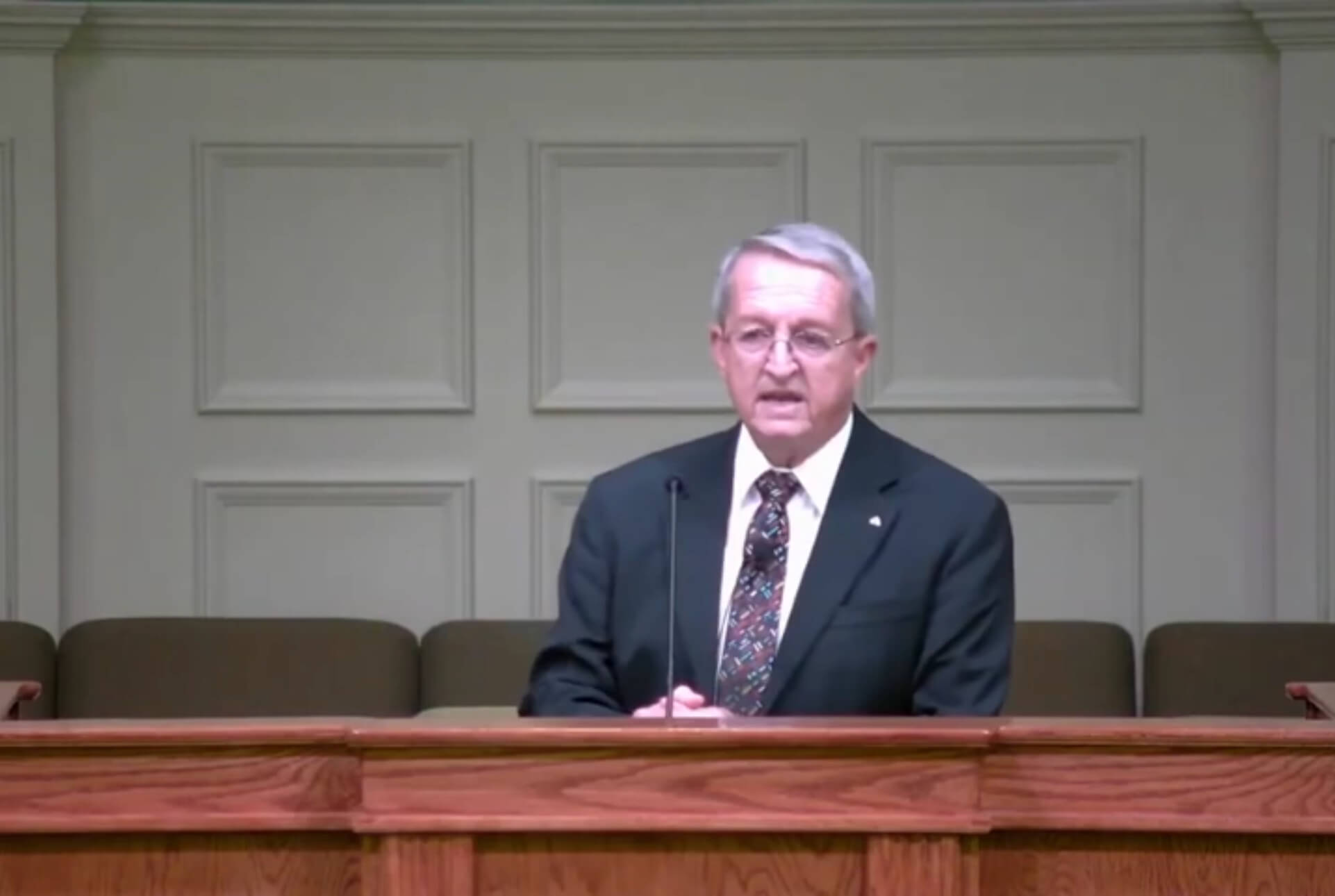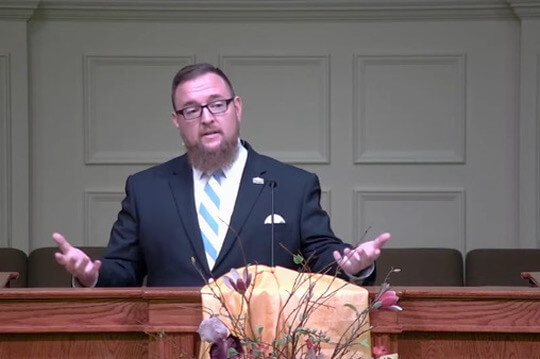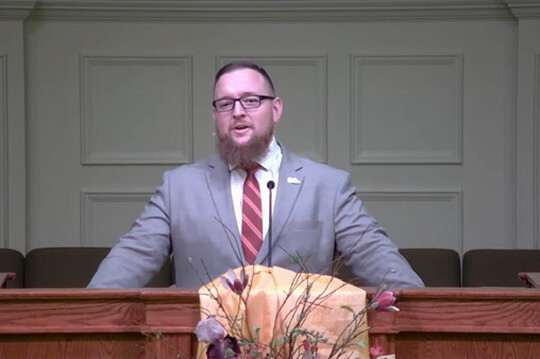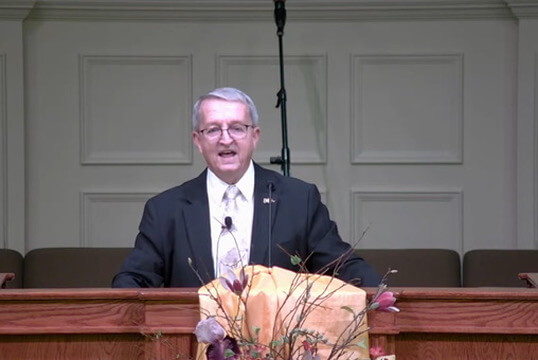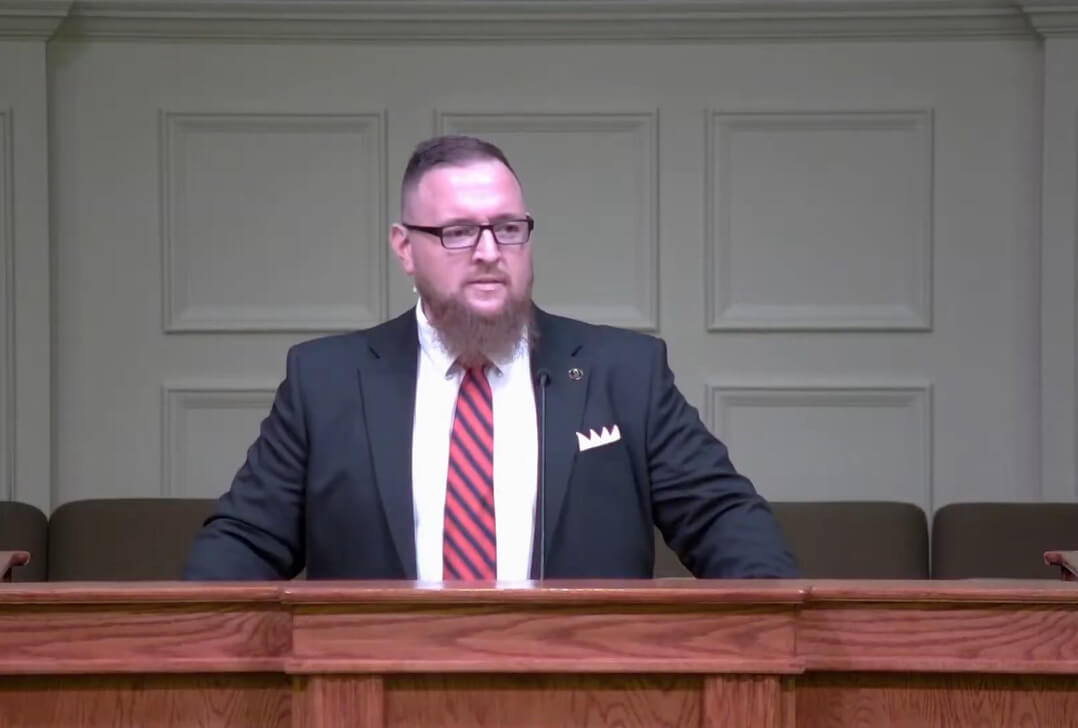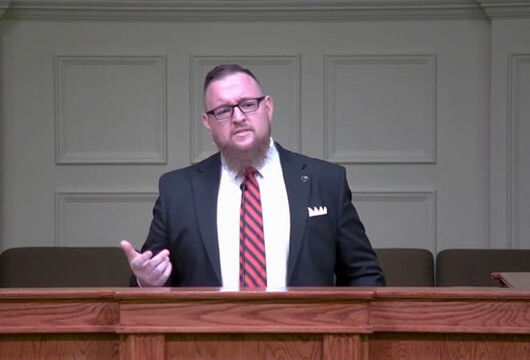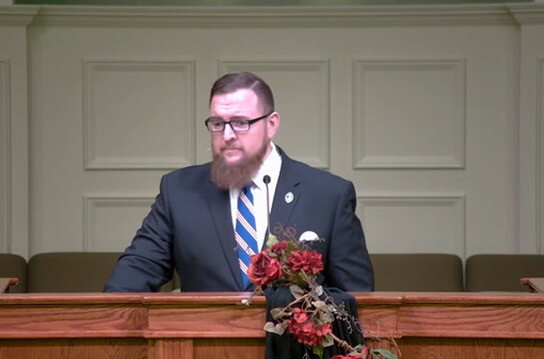Video
“Paul’s Charge Concerning the Congregation”
1 Timothy 5:1-16
Pastor Richard C. Piatt II
09/01/24
Audio
Transcript
We were up there saying, well, that worked. So I picked those two songs to join together. And if you were raised in a very, very traditional old time kind of a gospel church, that was not the closing hymn and we’re not leaving right now, okay? It goes with the theme of the message this morning. And in the tying of those two songs, you know, I don’t really read music like at all. If they go up, I go up. If they go down, I go down. And I just hopefully got started at the right place. But I was encouraged the fact that I noticed that the two songs were both 3-4 in time. And then my daughter encouraged me that it was in the same key. That’s why that all worked. And so God blessed me this morning to be able to do that. And you sang those two songs well.
And we have the topic of today, which really kind of goes together in so many ways. coming off of a 30-year high or maybe I should say a 30-year celebration high of last Sunday and the rejoicing of all that took place and for the notes that were filled in there were papers on the tables last week at our fellowship time and many people put down things that they remembered and they appreciated that and that I was involved in their lives. And some of those, maybe it’s just age. I’d like to claim humility, but I think it’s age. So a lot of that I forgot. When I do those things, it’s all genuine and it’s real, but I just don’t live in the victories of the past or the opportunities of ministry. But I do rejoice that I have the privilege and the honor to minister. And that is because, and it came out last week, that for me, for us, my wife and I, and for my family, they’re all here. I’ve got three children here today. I’ve got nine, and their spouses, and nine grandkids, and they’re all here today. But yet we really do view Fellowship Baptist Church as our family. And I have not been one of those kind of pastors that always wanted to keep the distance, to have the church and the laity on two levels. But I do enjoy this idea that we are the family of God. But I like the idea of within a local church that we are family. And that there’s to be family love. And in church history, and within church history, that’s not a good commentary.
There’s not a lot of good history of churches. There should be, but unfortunately there’s not. Because oftentimes you find churches where there’s a lot of gossip, there’s a lot of backbiting, a lot of, I won’t say even hatred at times, but where they’re missing out on what the church is really all about. You see, especially at some times in the churches like ours where the business of the church is preaching. We’ve seen in First Timothy already that as the old guy gives instructions to the young guy, and that is there at the church at Ephesus, and he’s laying out some things, and the first half of the book, a lot of it is doctrinal, a lot of it’s very practical, how a church ought to conduct itself. So he talks about how that there is an importance of sound or healthy doctrine. So we gotta get our theology right. And I’m very much that way. And I know Pastor Ryan is that way. Our deacons are that way. Our elders are that way. We want to be known that we have good doctrine, good teaching, and we want that. But then as it goes on in chapter two, we also want to conduct services. Now, this morning, our song service was pretty conservative and and there were reasons for that.
But but it was because the songs have a message of what we wanted to convey, the wonderful grace of Jesus. And the idea of we try to sing a psalm and Psalm 23 always ministers. And then the idea of the family of God and that we have love one for another, even when it comes time to have to leave here because we enjoy the presence of one another. But it’s been good and conservative, but we also want to have services not just to be on the conservative side and all of that, that’s not a biblical thing necessarily. There’s concepts and principles that apply. but we want to be where services are conducted accurately and on purpose and are biblical.
So in chapter two, Timothy giving instruction then talks about who ought to be praying that we should be a praying institution, that there’s a role for women and there’s a role for men and the role for women is not preaching. I got a message this week actually from a church over in Spring Hill that somehow I’m still going to call them and find out it’s faith community church, which sent me an encouraging package. And it was all about, they said, and the pastor wrote a message and said, I so appreciated your first Timothy chapter two passage, where you just finally told it the way it’s supposed to be told about the role of women in the church. And I’m going, wow, you know, I don’t know him. I don’t know the church. I don’t know anything about that. But then he went on and said how that they enjoyed biblical preaching and from the text and so forth. And so, Paul, we’re just preaching God’s word, but we’re trying to review what does. God think how churches ought to conduct themselves. What’s important? Well, in chapter three, he’s got the qualifications of elders, the qualifications of deacons. And that should mean something. You don’t just because a guy comes every service that doesn’t qualify him. There’s other qualifications and so forth.
In chapter four, it goes on and mentions the reason for it all is this because Um, false teachers from within the church, false teachers from outside of the church are real and are destructive in the midst of that. And so, and we’ve considered all of that. We are now in chapter five and in chapter five, Paul. in writing to Timothy is changing the emphasis again. It shouldn’t surprise us that he’s doing that because he’s wanting to get through the material. He wants to encourage Timothy so that he says in chapter four, verse 12, let no man despise your youth, but be an example. Because he was not an older man, he was a younger man. And he said, but you are the elder there and you need to lead that church. He gives him personal instructions, chapter four, verse 16, take heed to yourself and to the doctrine. Continue in them, persevere. Don’t be always looking for something new. And in this you will save both yourself and those who hear you. In other words, you don’t want to lose the gospel by constantly changing and so forth.
Now in chapter five, there is a dramatic change Kind of. And that is while the church is to be about good doctrine, biblical qualifications, preaching the word, amen, glory, hallelujah. And that is definitely what we want. But we don’t want to lose sight of the fact of the people, because if you lose the people, we don’t have people to preach to. The people are God image bearers. Whether you know Christ or not, you’re a God image bearer. And so if you’re here today and you’re not saved, you are welcomed because God has made you special. You are a human and you have the image of God and you need this. But if you’re here today and you are a Christian, well, you need the preaching of the word of God too. And sometimes the ministries that want to be and to have a God focus, which we must have, We don’t wanna lose sight of the fact that this is a congregation of people. And Paul doesn’t lose sight of that. And so in chapter five, he addresses the people.
Well, he does address the people for the letter was a public letter and it’s in scripture, but he’s addressing Timothy concerning the people. And when you have a ministry and you’ve got people, and let’s face it, while you’re all great, we’re all sinners. And and so there’s can be problems and difficulties. And a pastor has got to be gifted at being able to love his people no matter the problems. But also then when problems are when they arise, you handle them and you handle them correctly. Now, you know, that might strike you as a little bit bold to say that churches can have problems and preachers are supposed to deal with them, but that’s what Paul tells Timothy.
And in the first two verses of chapter five, we considered them on Wednesday night, he basically gives a philosophy of how to handle people, but there’s also so much more in this text. and that is not only do problems exist even where it breaks our hearts when we gotta go separate ways and all that according to that hymn we sang, but he gives a basic philosophy of what a pastor’s heart ought to be towards the people. Now you can make the application, this is good for you too, but it’s really important for preachers to know how to minister to people and when problems come up, what to do.
So notice chapter five verse one, and this is a general aspect or general application, he says, do not. rebuke, and that’s a very strong word, it can mean to give instruction, to exhort, it’s a military word, or even to command. But do not rebuke or exhort an older man And the original language, it’s an elder. But when you see the comparison, it is definitely just a man who was older. Do not rebuke or exhort an older man, but exhort him as a father. And younger men as brothers, older women.
Now, I just want to say, this is one reason why, and some pastors lose this, sometimes some pastors, especially if they’re the real, you know, work man, kind of thing, well, they kind of only view themselves as the pastors of the men, let the husbands take care of their wives. That’s not a biblical thought, because a pastor is to be the pastor of the women also. And he is to minister and he may have to exhort them. Well, how does he do that? Well, the older women as mothers. And younger women as sisters, and then I love the addition of the spirit of God in the text, and it says with all purity. Which, let’s face it, churches of pastors that fall into immorality with young women, that has done much to bring a reproach to the cause of Christ and to the church of Jesus Christ. An instruction that says, OK, you do have a relationship to the younger women, but you need to understand you treat them as sisters. And you do it with all purity. Now, that doesn’t mean the same not being true for older men and older women and younger men. You do that all with fear, but especially, in a sense, with respect to the younger women. So that shows that a pastor has a relationship to the congregation, men, women.
Now, he doesn’t address children, although I guess the younger ones, it kind of can go down there. But the idea is that a pastor is to be able to relate and to care for and you are responsible for all those age brackets. But then at that point in verse three, he goes to another set of group specifically. The other one is just general, older men, older women, younger men, younger women, that’s the general. Now he goes specific. If you look at verse three, honor widows who are really widows. And he continues that over into verse 16 when it says there, and it says that they may relieve those who are really widows. So this very specific section that is within verses three through 16, he’s talking about the church’s relationship and a pastor’s relationship to the widows. And may I say to the real widows. And that in that day and age, that was a real thing. And not only for the church, but as we’re going to find out here in a few minutes and that whole society. And then after that, and verse 17, he goes to a specific group to elders within the local church. Now he’s telling him, Timothy, this is how you handle elders. And the problems that are there, which is one of the arguments of the show of a plurality of elders within a local church, because this is and let the elders who rule will be counted worthy of double honor.
But then it goes on and verse 20 and those who are sending rebuke in the presence of all that the rest may also fear. But it says, but don’t take an accusation. This is verse 19. Do not receive an accusation against an elder, but from two or three witnesses. So elders within the local church, that if there’s a problem and they’re known for a particular sin, whatever, well, you know, you got to have two or three witnesses. And if there is a rebuke or sin, you rebuke them publicly.
Now, I can just hear people in today’s world say, well, that’s not very nice. That’s pretty mean. You know, you shouldn’t do that. Well, then you just go ahead and tell the Holy Spirit. He didn’t know what he was talking about. I’m not going to go there. Because, you see, my sin as an elder of the church can do a lot of damage. And if I do damage publicly to the church and I am caught sinning, well, when I’m rebuked, it needs to be a public rebuke also and a public repentance. Because, you see, the family is worth it. and sin is destructive.
Well, he goes on a specific group and then talks with them. Then he talks to those that are under particular burdens. Chapter six, verses one and two, let as many bond servants that are under the yoke count their own masters worthy of all honor. And this was in the day and age when they did have masters and slaves. And he approaches that and it says basically, Slaves, work as if you’re working for the Lord Jesus Christ and if you have a believing owner or a master, rejoice in that, do a good job. And since we don’t have that kind of slavery today, at least not on the surface, I don’t want to get involved in all of that, but just to say in a workman relationship, if you’re employed, Yeah, you know, he owns you for those eight hours or whatever per day. And so you serve him well as, you know, whatsoever you do, do all to the glory of God. And so he goes to specific people, not only that, but he also in chapter six, verse 17, command those who were rich in this present age not to be haughty. that there can be believers that will accumulate wealth, and it’s legal, and it’s fine, that just being a wealthy Christian is not bad, and so forth, but a pastor has to have a certain relationship, and we’re told on how to handle those kind of people. So this section of this last section of the book of First Timothy, very practical, people oriented and how you deal with it.
Well, this morning, what I want to do is is just very quickly, because we have our widow’s ministry. I want to consider chapter five, verses three through 16, and to just consider widows and the church and congregations and so forth. It may surprise you that perverse Not perverse, the one word, but per, P-E-R, and then second word, verse. That per verse, there are actually more verses on widows than there are for rich people or for elders or the like. And that’s because of the day and age in which this was written. For example, that in the Gospels, if you remember, well, Jesus on the cross remembered his mom. because apparently Mary was a widow and he gave Mary, you know, woman, behold, your son, behold, your your mother, that as being the oldest son, the son that opened up the womb of Mary, that it was his requirement to take care of Mary because she would have been a widow.
Not only that, in the Gospel of Mark and in the Gospel of Matthew, they had laws back then of how to handle the older generation by the younger generation, the children. And they even had a law that was called Korban. and that there were certain laws and there were ways to get around it. The Pharisees knew all about that. And when that would happen, and that was considered a scourge on that day and age. In the book of Acts, the first problem within the church was around widows. Remember the Hebrews and the Greeks? You’re liking those one set of widows better than the others. And why are the Hebrews getting more than the Gentiles and the Greeks? And so remember, that was the whole thing.
Deacons now, they were said, choose you out from among yourselves, seven men of honest report and so forth. And you men, the deacons of the church, the servants of the church, take care of the widows. It is a big deal within church history. This is not an office equal to the office of elder or pastor, but within church history, it was about, I think it said the second through the fourth century, that there was what was known as the widow office. And the widow office were the elderly women of, and some want to come to this text, that is not what the Holy Spirit was talking about, but the widow office was those of the older women of the church that were involved in paperwork or of works of charity, of love, and of kindness And many believe that that was the beginning of nunnery, as then the Roman Catholic Church got started.
And this whole thing, it talks about how younger women are supposed to get married, you know, because if they grow wanton, but if they take an oath of celibacy, and we can just see the Roman Catholic Church developed into that. If you ever wondered historically where nunnery came from, It was a historical development, but it was because within the society, widows were such an entity. So Paul now writing to to Timothy, and based upon the Old Testament, listen to some of the biblical warnings concerning widows in Exodus chapter 22, verses 22 through 24. You shall not, quote, you shall not afflict any widow or fatherless child. If you afflict them in any way, they will cry. Out all to me I will surely hear their cry and my wrath will become hot and I will kill you with the sword Your wives shall be widows and your children fatherless.
Well, that’s kind of point blank. Deuteronomy 27 verse 19. Cursed is anyone who withholds justice from a foreigner, the fatherless or widows. Then all the people shall say, Amen. The prophet Isaiah said, learn to do good, seek justice, correct oppression, bring justice to the fatherless, plead the widow’s cause. Psalm 146 verse 9 says the Lord watches over the sojourner. He upholds the widows and the fatherless. But the way of the wicked is to bring ruin. And Psalm 68 5 says God is the father of the fatherless and a judge for the widows.
There was the book of Ruth. Remember, Naomi was a widow, then her two sons die, and the two daughter-in-laws, and then Ruth eventually then remarrying and going to be with Boaz. Whole book, the book of Ruth, and a ministry of the widows. Jesus in his ministry, the widow and the mite, and how she gave. The idea of the woman of Nian who had her son resurrected of the Lord. And the book of James, James written late in James chapter five, true religion is this, visiting the orphans and widows and their distress.
So you can’t get around the reality of widows was a major part of the scriptures, Old Testament, New Testament. It was also that of synagogues of that day and age. This was it was more than what just the Jews could do among the Jewish women that were widows during early New Testament Christianity. And in that first century, when men were being martyred for their faith, There was just an overabundance of these women, and it shows us that the church has obligation to widows.
But now what’s interesting in the United States of America, and because of the wealth and where we are as a culture, that isn’t always, if a woman is a widow, not always, many times it is, and there’s many other needs that she may have. But depending upon what her husband did, what kind of money he made, she may be actually better off than some of the other people in the church. And so that’s why you need to know who is a widow, but also who are the widows in need. And there’s a passage in these qualifications when we get it to here, it’s gonna say that she had children.
Well, is this for only widows that were productive with baby making or others? And that you can see that this is not an all-inclusive thing and that you may have, and in our church we do, women who have been single their whole lives, single missionary on a missionary field, that they can be a single adult woman that are at times in need and the church has responsibilities to these women or even to those of maybe a widower in need and that’s the reason why this morning after we receive communion, we take a benevolent fund offering and we give that money 100% to those who are desperate or to those that are in need or in needing encouragement.
Now, this would be one of those key passages why we do that. And so let’s take a look at it now and to see in the context of this pastoral care of various members of the congregation, the obligation to support widows. Well, to do that, you gotta first identify who the widows are. The word that is used is a woman whose husband is dead. Obviously, but not only that, because in the New Testament times, it could be a woman who was bereft, her husband abandoned her, or someone that he wasn’t around and that there was a particular need. It was even as broad as one who had been robbed, suffered loss, was left alone. This could be all by death, desertion, divorce.
Remember Paul giving instruction in first and first Corinthians. If you’re a believer and you’re married to a believer, you’re not to get a divorce. If you’re married to a believer and the nonbeliever wants out. Remember what it said? Let him go. In our society, you can’t stop it. Well, then is she allowed to remarry and all those kind of practical little questions. But the idea is, she was bereft, she was left, she is destitute, she is left alone. Well, the question is, does she have a family and some other things, we’ll see that.
Many men were imprisoned, and while they still had a living husband, he was of no financial asset, we’ll put it that way. He was not able to help, and the church had many of those. These would be applied there. Are those set free from a polygamous or a multi-harem kind of a situation? A man has got more than one wife. and he becomes a Christian and he releases those women, well the Christian guy should have tried to come and meet, but if he had too many, or what if she was destitute because anyway, then you’ve got this woman. So the identification of who this widow is is a little bit broader than what we have in our own day and age.
So it has to do with the fact a woman in desperate need or a person in desperate need. Identify in a sense that we’re to show them honor, respect, care for, to meet the needs. Identify the widow in deed or who is actually in reality with this one. The qualifications would be a widow with no family. And the reason is gonna be given in the text because older people are at first the burden of the family. We’ll let that go. And he’s very specific on that. And there are family obligations, but they’re also in the state of being forsaken without resources being able to be met. She needed to be a believer and she needed to be godly. And those qualifications were given. Now, I’ve given you the bit of an outline, but let’s go see the text. Chapter three, honor widows who are really widows. In other words, come alongside, meet their needs, show them respect, take care of them.
Okay, but if any widow has children or grandchildren, let them first learn to show piety at home and to repay their parents, and we could imply their grandparents, the piety at home and to repay their parents for this is good and acceptable before God. So children, if you have living parents and they become destitute or in need, it is your responsibility to make sure they’re taken care of. Now that may not necessarily mean that you do all the caring, but let’s face it, they changed your diapers, you might need to change theirs. Or you can just make sure that they’re somewhere or pay someone else to actually do it, but you meet that need. The church, this is not a blank check where the church takes all of its financial resources and they plummet it. That’s first of all, the responsibility of the family.
But not everyone has children. Not every child is able to maybe take care of an older parent or so forth. but it is a good and acceptable thing to take care of your parents. But notice it goes on, verse five. Now, she who is really a widow and left alone, meaning she has no family, she trusts in God, she’s a believer, continues in supplications and prayers, and that was part of what that office of widow was known in the early church. That the grace of God was put on display by providence of using women like this. And she had supplications and prayers night and day. She was faithful. But she who lives in pleasure is dead while she lives.
In other words. You may have a widow. and she is really committed to the church, and she prays, and supplications, and she’s really involved. Or you may have a widow, she professes to be a believer, but she’s out living in pleasure. That is, she’s not really an asset to the church, spiritually speaking, she’s not following the things. He’s very clear that she who lives in pleasure is dead while she lives.
Now, some have taken that she’s spiritually dead, that is, she’s living in pleasure, she’s not really saved. Others, like John Calvin and others, said, no, that doesn’t mean that she’s spiritually lost. It just means she’s living like the world. She has not identified with God’s people. She’s not heartbroken, inwardly being heartbroken when she leaves this place. These things command that they may be blameless, But if anyone does not provide for his own, and especially for those of his own household, he has denied the faith and is worse than an unbeliever.
Now that tells you, too, that even unsaved people have enough common sense to take care of their parents. This goes all the way back to the Ten Commandments. Honor thy father and mother, that your life may be long on the earth. It’s an important thing that we take care of the elderly. He says, okay, but we’re still trying to find out who are the widows indeed, and is this just anyone who’s been bereft? Well, he goes on, verse nine, more qualifications. Do not let a widow under 60 years old be taken into the number, unless she has been the wife of one man. Okay, we can stop right there for a moment. She’s gotta be 60 years old.
Now, this is where you get the idea if she’s 58 and she’s really in need. You don’t just give her bread crust until she turns 60, and then you give her the full peanut butter and jelly sandwich, okay? This is not the law that Medes and Persians, and the reason why we know that’s because of some of these other things, because it says there in that next one, to be old, taken into the number, unless she has been the wife of one man, well, what if she was never married? Or what if she was married, widowed, and then remarried, and then widowed, but she’s 58? Well, she’s had more than one man, one husband. It’s interesting, it’s the same word put on the back. Remember in elders to be a one woman kind of man? That is, he’s not a womanizer. Well, this one is a one man kind of woman.
Now it doesn’t necessarily mean that she has been promiscuous, but it does mean, you know, just like men can be a woman flaunter, Women can be the same way. The one picture I got was in a, even in a cartoon when it says, you know, a woman who wants to say, hey, come up and visit me, you know, again, big boy. And that whole kind of thing, you know, that trying to flirt, she’s not a flirt. Okay, here we go. She’s been the wife of one man or she’s a one man kind of woman. Not a mannerizer. We said womanizer, a mannerizer. I think I just made up. OK, write it down. Piattism. If you weren’t here last week, I’m sorry. I come up with some good ones, but that’s probably one.
Verse 10, well reported of for good works. What’s your reputation? Is she known for being a godly Christian woman? If she has brought up children. Now one man put out there was enough orphans around in that day and age that it didn’t mean necessarily she raised her own kids. She took care of other kids. She brought up children. If she’s lodged strangers, that’s given to hospitality.
Again, in that day and age, very important, traveling preachers. If she’s washed the saints’ feet. Now, I went to a Grace Brethren Seminary, Grace Theological Seminary, and they believe that washing feet is an ordinance. And they make a big deal that she participated in the ordinance of foot washing. I’m a Baptist, I don’t think foot washing was an ordinance, but I do think foot washing was required, and they did it a lot in that day and age, and she was known for being humble towards the believers, even to the point of washing people’s feet, as maybe what slaves did and the like. But she washed the saints’ feet, if she’s received the afflicted, if she’s diligently followed every good work. Is she known for being a good woman?
She can be added to the role, but look at verse 11, but refuse. And it’s the idea of refuse to enroll. Don’t just kick them out of the church. That would be ridiculous. It’s just these are not widows indeed. Refuse the younger widows for when they have begun to grow wanton. And that is a phrase, a very unique phrase, that means that they are still very much sexually active. They’re wanting to get married. They’re concerned about that. It’s a hapax legomenon. There it is. It is a one-time occurrence. And Paul was using this, that they knew in that day and age, that it was used, now please don’t read too much into this, to an ox trying to escape the yoke. It was the idea of she really wants to be married. She wants to be sexually active. She wants to have, be married.
Notice, and when they had begun to grow wanton against Christ, That is, it’s getting confused to saying that she doesn’t want to remain celibate. They desire to marry, having condemnation because they have cast off their first faiths or the vow, V-O-W, the vow to be faithful and celibate. And besides, they learn to be idle. So it’s just basically a woman who wants to be sexually active and wants to get married, maybe to try to have kids, because she’s talking about the younger widows now. Don’t put them on. Don’t enroll these women. We’re talking about women that are destitute and they need help. And besides, they learn to be idle.
Oh, I also want to say there was a comment. I don’t know. I’m just going to say this because if you read anything on this. It seemed that a lot of people thought that if you were 60 probably the chance of remarrying. was less. After 60, you’re not gonna get married. I don’t know that that’s as true today. What’s actually, in some ways today, it’s worse. Some of the older people, because they’re more worried about keeping their first husband’s retirement or whatever, older people are living together, not married. I just want to publicly say that is just as sinful as younger couples that live together not being married. Fornication is fornication and it doesn’t have an age limit. And that is sin. And that is wrong. But in this passage, you say, if they’re 60, yeah, they’re probably not gonna wanna get married again.
Now, in our culture, 60, if you wanna get married and if you have much wealth and you’re trying to figure out what to do with the assets and what are you gonna do with his kids, her kids, it gets to be kind of messy at times. You may wanna think about it. That’s my pastoral advice to you. But here, it just says that, You don’t add them if they’re young enough, they’re still wanting kids, they’ll probably remarry, you don’t put them on the list and take them off the list. This was a major thing within the church. But it says, and besides, they learn to be idle, wandering about from house to house, not only idle, but also gossips, busybodies, saying things which they ought not. Because the church is maintaining them, they don’t have to get a job, and they’re spreading dissension. Now again, people say, wow, that’s pretty pointed.
Well, Paul said, pastors, you may have to deal with that, and you can do it. But if it’s an older woman, you treat her like your mother, and if it’s a younger woman, you better treat her like she’s your sister. But you gotta treat it. Therefore, I desire that the younger widows marry, bear children, manage their house, and give no opportunity for the adversary to speak reproachfully. Now, may I just quickly say, that those, since the idea of the term widow or a person totally bereft, there’s always been this question of sometimes in our fundamental circles, is it okay for a widow to remarry? Yes. There’s nothing wrong. Is it okay for a younger woman to remarry? Yes. And right here’s the proof. Have kids, don’t just try and stay single for some kind of a reason, and then you end up with all kinds of frustrations. It’s okay to remarry, establish a home. Verse 15, some men have already turned aside after Satan. In other words, some of these people, widows, have turned aside after Satan.
But if any believing man or woman, and the term man there is debatable, but since that was introduced in verse 15, Woman has widows, let them relieve them and do not let the church be burdened that it may relieve those who are really widows. We’ll talk about that maybe this coming Wednesday night, but let me just say this. The church. I’m going to take a broader than that. The Bible and God is the author of the Bible. that if you’re here a widow or you’re a woman that has been left destitute from a man, God cares for you. And in the Holy Scriptures, the church and the people of God and the nation of Israel in the Old Testament was given specific instructions. Don’t ever feel that you’re alone. Don’t ever feel so destitute. You’ve got family. But if the family forgets it, the church is obligated to help take care of you.
Now that also, and this is not gonna be well received in today’s day and age, but there’s probably some male complementarianism in this. Because you see, God has had men that are to take care of women. And when that is lost, he has also established a nation and a thing called the church to help take care of you, family being part of that. Because women, I wanna say this carefully, but women need to be taken care of. Women need to be loved and cared for. And when they have been left destitute, best pictured by that of a widow, the church needs to come alongside if the family is not able to. And the church can come alongside and bring, you know, encouragement emotionally. but it may include some money and help because God cares for women. Now, why do I say that? Because remember in chapter two, but women aren’t to preach, women weren’t supposed, and we’ve already heard in this book, things that women are not supposed to be involved in because men are to do it. Men are also to take care of their widows. But what if they die or they’re put in prison or some other way not able to take care of them?
Well, then the church needs to come alongside in that absence and in the absence of children. The Scottish preacher in McLaren told a story about a woman in his church. And. that she just felt like she just didn’t have an important life. She had had four children. She had had much of her life destitute, became a believer. And she said, I couldn’t get a good job and everything, but I raised these four boys. And I just don’t feel like, I feel like I just wasted my life. And I could have done so much more for Christ. Well, Pastor McLaren said, okay. What are the names of your boys? She said, Well, I named him after the four Gospels, Matthew, Mark, Luke and John. Well, that was pretty cool. He says, Where are they now?
Well, Matthew was a missionary in some foreign field, another one, and they were all serving the Lord in different things. And he said, and all you did was work hard, give him a good, clean home and you fed him and everything. And she said, yeah, it just seems to be such a waste. He said, it sounds like to me, you just had a very productive life. So in the midst of this, the local church ought to run itself that there are roles for men, there’s roles for women, but women don’t ever think that that’s just a man’s church or we’re just tagalongs. No, there are responsibilities here as well and that God cares for you and your pastors care for you as well.
Let’s pray. Our Father in heaven, how we thank you for your love Father, you love all of us, and sometimes when circumstances in life direct us in a unique way, sometimes we may feel, but does he really think about me? That may be whenever there comes a time of death and people are left alone, for today we’ve kind of emphasized that it’s from on the side of women. But there’s also that side as well, that there can be widowers. and they are destitute and could be. It’s not as likely, and in that culture, not as likely, but it could still happen. That’s why we need to have hearts of love and compassion. Now, Father, as we think about these things, as we think about our blessed Savior who gives us these words and who loves us all, And in his resurrection, we celebrate the body and blood of Christ as we come to the communion service. Bless us, we ask, in Jesus’ name, amen.
